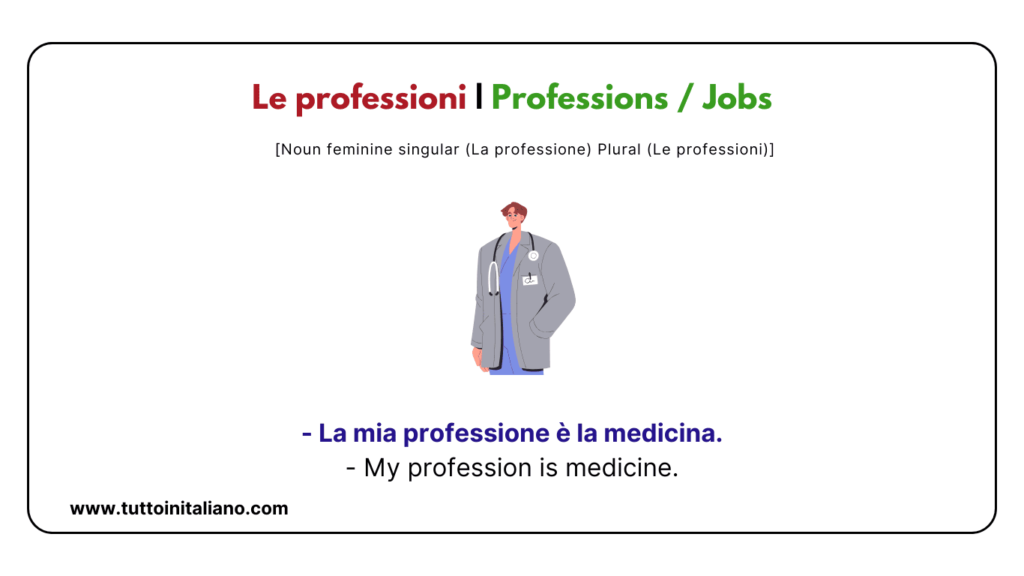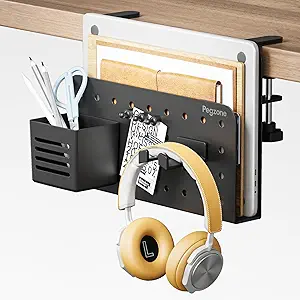1. How do you ask someone about his job in Italian?
In Italian to ask about the job we use the verb do (fare). In Italian, we conjugate the verb in the third person singular (Lei > fa) when we want to ask politely, and in the second person singular (Tu > fai) if we want to ask in a friendly way as in the example:
- Che lavoro fa? What job do you do? (Formal)
- Che lavoro fai? What job do you do? (Informal)
- Cosa fai nella vita? What Do You Do? (Informal)
2. How to talk about about your job in Italian?
In Italian to talk about your job or to answer when someone asks you about your job you can use the verb [to do (fare) + the definite article + the job name] or the verb [to be (essere) + the indefinite article + the job name] or the verb [ to work (lavorare) without using any definite or indefinite article] as in the example.
- With Fare: Faccio la/il giornalista (I am a journalist).
- With Essere: Sono una/un giornalista (I am a journalist).
- With Lavorare: Lavoro come giornalista (I works as a journalist).
3. How to form the name of a job from masculine to feminine in Italian?
To change the gender all you need is to change the ending of the masculine nouns as in the table:
| The ending | Masculine | Feminine |
| -o > -a | L’Architetto | L’Architetta |
| -ore > -rice/-oressa | Il Pittore Il Dottore | La Pittrice La Dottoressa |
| -e > -e | Il Cantante | La Cantante |
| -ista > -ista | Il Dentista | La Dentista |
| -iere > -iera | Il Parrucchiere | La Parrucchiera |
| -a > -a | Il Pilota | La Pilota |
| -io > -ia | Il Macellaio | La Macellaia |
Amazon Ads
Italian vocabulary for beginners: list of job names in Italian and their meanings

- Le Professioni (Professions / Jobs)
- Il Lavoro (The Work)
- L’Impiegato (The Employee)
- L’Operaio (The Worker)
- L’Ingegnere (The Engineer)
- Il Contadino (The Farmer)
- Il Cameriere (The Waiter)
- Il Commesso (The Clerk)
- Il Medico / Il Dottore (The Doctor)
- Il Meccanico (The Mechanic)
- Il Poliziotto (The Policeman)
- L’Infermiere (The Nurse)
- L’Elettricista (The Electrician)
- Il Muratore (The Bricklayer)
- Il Cuoco (The Cook)
- Il Giornalista (The Journalist)
- L’Avvocato (The Lawyer)
- L’Attore (The Actor)
- Il Sarto (The Tailor)
- Il Barbiere (The Barber)
1. le professioni | professions / jobs
Noun feminine singular (La professione) plural (Le professioni)

- La professione di Raffaele è agricoltura.
- Raffaele’s profession is agriculture.
- La mia professione è la medicina.
- My profession is medicine.
2. il lavoro | the work
Noun masculine singular (Il lavoro) plural (I lavori)

- Che lavoro fai?
- What job do you do?
- Cosa fai nella vita?
- What Do You Do?
- Faccio il sarto / Sono sarto.
- I’m a tailor.
3. l’Impiegato |the employee
Noun masculine singular (l’impiegato) plural (Gli impiegati) feminine singular (l’impiegata) plural (Le impiegate)

- Sono un impiegato di banca.
- I’m a bank employee.
- Gli impiegati si aspettano un aumento di stipendio.
- Employees expect a pay rise.
4. l’Operaio | the worker
Noun masculine singular (l’Operaio) plural (gli operai) feminine singular (l’operaia) plural (le operae)

- La fabbrica ha circa trecento operai.
- The factory has about three hundred workers.
- Faccio l’operaio in una fabbrica di scarpe.
- I’m a worker in a shoe factory.
5. l’Ingegnere | the engineer
Noun masculine singular (l’ingegnere) plural (gli ingegneri) feminine singular (l’ingegnera) plural (Le ingegnere)

- Voglio diventare un ingegnere elettronico.
- I want to become an electronic engineer.
- Selvaggia lavora come un’ingegnera.
- Selvaggia works as an engineer.
Amazon Ads
6. il contadino | the farmer
Noun masculine singular (Il contadino) plural (I contadini) feminine singular (La contadina) plural (Le contadine)

- Il contadino lavora nel campo ogni giorno la mattina.
- The farmer works in the field every day in the morning.
7. il cameriere | the waiter
Noun masculine singular (il cameriere) plural (i camerieri) feminine singular (la cameriera) plural (Le cameriere)

- Angelo è un cameriere in un ristorante sul mare.
- Angelo is a waiter in a seaside restaurant.
- Faccio la cameriera nelle vacanze estive.
- I work as a waitress in the summer holidays.
8. il commesso | the clerk
Noun masculine singular (Il commesso) plural (I comessi) feminine singular (La commessa) plural (Le comesse)

- Rita lavora come una commessa in un negozio di abbigliamento.
- Rita works as a saleswoman in a clothing store.
- Carlo fa il commesso in un negozio di scarpe.
- Carlo works as a clerk in a shoe shop.
9. il medico / il dottore | the doctor
Noun masculine singular (Il medico / Il dottore) plural (I medici / I dottori) feminine singular (La medica / La dottoressa) plural (Le mediche / Le dottoressa)

- Il dottore lavora in un ospedale.
- The doctor works in a hospital.
- Mio padre non fa l’insegnante, fa il medico.
- My father is not a teacher, he is a doctor.
- Il dottore lavora tutti i giorni nella sua clinica dalle 15.00 alle 21.00.
- The doctor works every day in his clinic from 3pm to 9pm.
- Il medico cura i malati nel pronto soccorso.
- The doctor treats the sick in the emergency room.
10. il meccanico | the mechanic
Noun masculine singular (il meccanico) plural (i meccanici) feminine singular (La meccanica) plural (Le meccaniche)

- Il meccanico ha riparato la mia macchina in poco tempo.
- The mechanic fixed my car in no time.
- Sei davvero un bravo meccanico.
- You are a really good mechanic.
Amazon Ads
11. il poliziotto| the policeman
Noun masculine singular (Il poliziotto) plural (I poliziotti) feminine singular (La poliziotta) plural (Le poliziotte)

- Il poliziotto lavora in questura.
- The policeman works at the police station.
- Sono un poliziotto sotto copertura.
- I’m an undercover cop.
12. l’Infermiere | the nurse
Noun masculine singular (l’infermiere) plural (gli infermieri) feminine singular (l’infermiera) plural (Le infermiere)

- L’infermiere aiuta il dottore.
- The nurse helps the doctor.
- L’infermiere dà le medicine ai malati.
- The nurse gives medicines to the sick.
13. l’Elettricista | the electrician
Noun masculine singular (L’elettricista) plural (Gli elettricisti) feminine singular (L’elettricista) plural (Le elettriciste)

- Ho un problema con l’elettricità devo chiamare un elettricista.
- I have a problem with the electricity i need to call an electrician.
14. il Muratore | the bricklayer
Noun masculine singular (Il muratore) plural (I muratori)

- Il muratore costruisce le mura di casa.
- The bricklayer builds the walls of the house.
15. il cuoco | the cook
Noun masculine singular (Il cuoco) plural (I cuochi) feminine singular (La cuoca) plural (Le cuoche)

- Il cuoco lavora nella cucina del ristorante.
- The cook works in the kitchen of the restaurant.
- Mia madre è la migliore cuoca del mondo.
- My mother is the best cook in the world.
Amazon Ads
16. il giornalista | the journalist
Noun masculine singular (Il giornalista) plural (I giornalisti) feminine singular (La giornalista) plural (Le giornaliste)

- Il giornalista lavora nel giornale.
- The journalist works in the newspaper.
- Il giornalista scrive articoli per i giornali.
- The journalist writes articles for newspapers.
17. l’Avvocato | the lawyer
Noun masculine singular (L’avvocato) plural (Gli avvocati) feminine singular (L’avvocata / L’avvocatessa) plural (Le avvocate / Le avvocatesse)

- L’avvocato rappresenta le persone che hanno problemi legali.
- The lawyer represents people who have legal problems.
- Un avvocato difende un prigioniero in tribunale.
- A lawyer defends a prisoner in court.
18. l’Attore | the actor
Noun masculine singular (L’attore) plural (Gli attori) feminine singular (L’attrice) plural (Le attrici)

- Monica Bellucci è una attrice famosa.
- Monica Bellucci is a famous actress.
- Roberto Benigni è un attore bravo.
- Roberto Benigni is a good actor.
- Gli attori del film sono già sul set.
- The actors in the film are already on set.
19. il Sarto | the tailor
Noun masculine singular (Il sarto) plural (I sarti) feminine singular (La sarta) plural (Le sarte)

- Il sarto mi ha sistemato il vestito.
- The tailor fixed my dress.
- Il sarto fa i vestiti.
- The tailor makes clothes.
- Il sarto lavora con la macchina da cucire.
- The tailor works with the sewing machine.
20. il Barbiere | the barber
Noun masculine singular (Il barbiere) plural (I barbieri) feminine singular (La barbiera) plural (Le barbiere)

- Vado dal barbiere due volte alla settimana.
- I go to the barber twice a week.
- Mi sono fatto tagliare i capelli dal barbiere.
- I had my hair cut at the barber’s.
Reading and listening
Cosa vuoi diventare quando sarai grande?
What do you want to become when you grow up?
- Sono Margherita e voglio diventare una dottoressa per aiutare mio padre che lavora come un muratore. Voglio anche diventare una dottoressa per curare i pazienti con l’aiuto dell’infermiera.
- I am Margherita, and I want to become a doctor to help my father who works as a bricklayer. I also want to become a doctor to treat patients with the help of a nurse.
- Mi chiamo Carla e voglio diventare un’attrice famosa come Sophia Loren e recitare in grandi film con grandi attori e attrici, adesso pero sono una commessa in un negozio di abbigliamento.
- My name is Carla and I want to become a famous actress like Sophia Loren and to act in great films with great actors and actresses, but now I’m a saleswoman in a clothing store.
- Ciao! sono Bruno e il mio sogno è diventare un giornalista perchè mi piace leggere e scrivere, forse un giorno posso scrivere un articolo per un giornale grande come la Ribupplica.
- Hello! I’m Bruno and my dream is to become a journalist because I like to read and write, maybe one day I can write an article for a newspaper as big as the Ribbulica.
Exercises on job names in Italian with answers.
A). Write the feminine names of these jobs.
- L’ingegnere
- L’attore
- Il cuoco
- Il giornalista
- Il sarto
The answer
- l’ingegnera
- L’attrice
- La cuoca
- La giornalista
- La sarta
B). Write the masculine names of these jobs.
- L’infermiera
- L’avvocata / L’avvocatessa
- L’operaia
- La medica
- La commessa
The answer
- L’infermiere
- L’avvocato
- L’operaio
- Il medico
- Il commesso




















